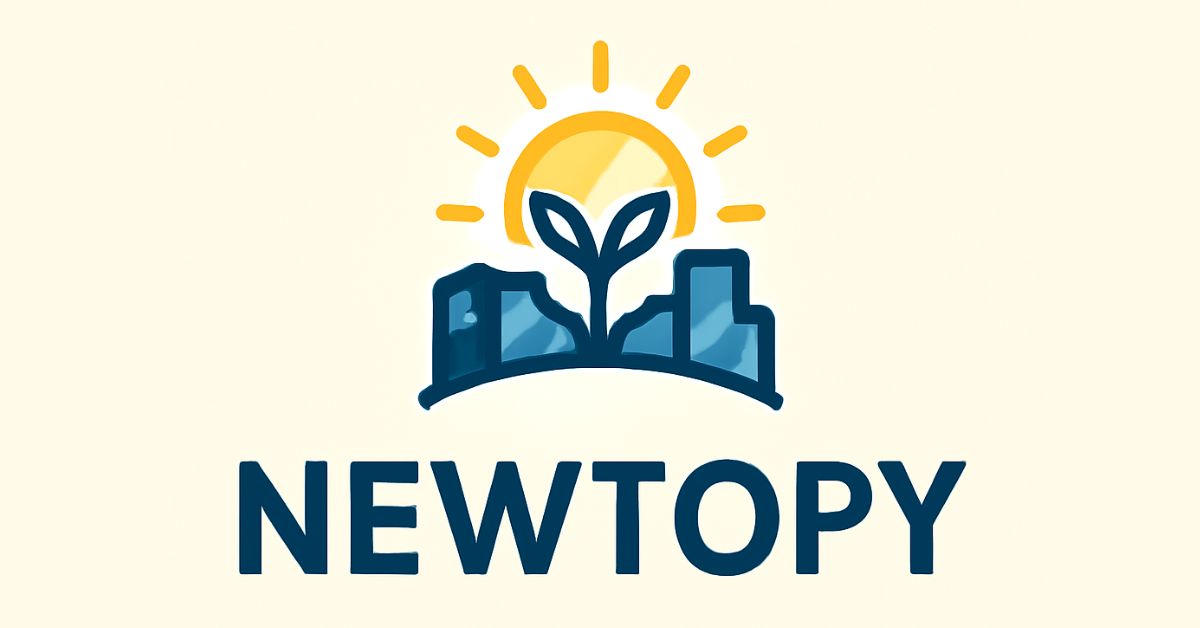Newtopy: Redefining Innovation with Realism

Envision a society where originality is unrestricted, sustainability is paramount, and innovation flourishes in tandem. A new idea called Newtopy is changing our perspective on progress. At a time when conventional utopian models are either unrealistic or impractical, Newtopy provides a welcome alternative that is both realistic and ambitious for revolutionary change.
This groundbreaking concept has captivated scholars from many walks of life from its start in the early 2020s, as we rethink societal structures and find our way through intricate systems. While Newtopy has not yet achieved mainstream status, it is subtly gaining support in certain specialized academic communities and think tanks. For those who are ready to reimagine responsible innovation, its ideas offer tremendous promise.
Join us as we explore what Newtopy truly means and discover its profound implications for our future. Whether you’re an entrepreneur seeking fresh perspectives or simply curious about new ideas shaping our world, this comprehensive guide will illuminate the path ahead.
What is Newtopy?
Combining the ideas of novelty with utopia, the name “newtopy” captures their potency. “Utopy” is based on the concept of idealistic societal ideas, while the first element, “new,” represents the spirit of change.
Combining the two approaches provides a basis for creative thinking that isn’t afraid to be realistic. The goal of newtopy is not to propose unrealistic goals but rather to initiate realistic, incremental change.
This idea first surfaced in the early 2020s among scholars working across disciplines, and it has since become popular as a way to analyze complicated systems. While staying firmly rooted in attainable goals, it promotes innovative approaches to social concerns.
The influence of newtopy is expanding among specialized academic communities and think tanks, while it is still not widely used. Those seeking to create in a responsible and considerate manner amidst fast societal changes may find resonance with its values.
Origins and Definition of Newtopy
The combination of idealism and novelty in newtopy is intriguing. Part one, “new,” represents revolution and ground-breaking ideas. It represents a spirit of creativity that questions the status quo.
The second part, which takes its cue from the word “utopia,” describes a perfect society in which everyone’s dreams come true. Newtopy aims for a middle ground between ideals and reality, in contrast to conventional utopias that are usually written up as impractical.
This concept emerged in the early 2020s and quickly gained popularity among scholars working across disciplines. They saw its potential for rethinking social structures and managing complicated systems.
A new perspective on sustainability and responsible innovation emerged with the rise of newtopy. It perfectly encapsulates the spirit of the times, which is a drastic shift away from idealistic ideals and toward more practical, achievable goals.
Key Principles and Concepts of Newtopy
What sets Newtopy apart from more conventional frameworks is its adherence to a small set of fundamental principles. Integrating idealism with innovation is central to its philosophy. While being firmly rooted in reality, this union promotes creative thinking.
The importance of cross-disciplinary collaboration is another fundamental idea. The goal of Newtopy is to encourage communication across disciplines in order to increase the depth and breadth of understanding in problem-solving.
A crucial role is also played by sustainability. As an alternative to striving for the impossible, newtopy advocates for systems that strike a balance between economic development and environmental preservation.
Adaptability is also crucial; newtopy views change not as an enemy but as an integral part of the process. It acknowledges that new ideas need to be adaptable in order to meet the changing demands of society.
Within the framework, diversity is intrinsically prioritized. Newtopy aims for inclusive progress by amplifying voices that are underrepresented, so that no one is left behind.
How Newtopy is Changing the Landscape of Innovation
Innovation is being transformed by Newtopy, which is bringing together the domains of creative and practical application. As long as they don’t lose sight of reality, it says, intellectuals may keep exploring new possibilities. This harmony promotes an environment where new ideas can grow alongside practical plans.
An atmosphere suitable for new breakthroughs is fostered by Newtopy through its emphasis on cross-disciplinary cooperation. Collaborative problem-solving by domain experts yields comprehensive answers that conventional models fail to capture.
Plus, it motivates businesses to start using more eco-friendly methods. Idealistic goals and ethical concerns do not conflict; rather, they live side by side. Nowadays, companies care more about making good decisions and having an influence in the long run than they do about generating quick profits.
Inclusivity in innovation processes is also championed by this growing notion. By ensuring that every voice is heard and considered as we work together to imagine better futures, diverse viewpoints greatly enhance the quality of our solutions.
Criticisms and Challenges of Newtopy
Critics have voiced their disapproval of Newtopy, as they do with every new idea. Negative thinkers point out that when ideals and novelty come together, it’s easy for people to get their hopes up. Aspiring for progressive change, they argue, could lead people to ignore real constraints.
Some have even argued that Newtopy isn’t well-structured enough. The lack of clarity in this might make it difficult to use in practical situations. Interdisciplinary thinkers may find it difficult to put its concepts into practice in the absence of clear rules.
Another issue that comes up when people talk about Newtopy is the possibility of elitism. One criticism is that not everyone has the opportunity to participate in these discussions, which might lead to those who could benefit from fresh perspectives feeling left out.
Concerns over the term’s long-term viability have been raised by its quick development. In a changing culture, will Newtopy change too? On the other hand, will it be just another passing fad?
The Future of Newtopy in Innovation
Newtopy has the ability to revolutionize innovation landscapes in the future. A stimulating setting for original thought is created by its one-of-a-kind combination of fresh ideas and idealistic goals.
This paradigm is being used more and more by both individuals and organizations to deal with complicated problems. This method promotes group problem-solving that values different points of view and strives for long-term solutions.
As a result of developments in communication and technology, “new topy” is quickly becoming a global phenomenon. It allows creatives to collaborate across fields, shattering the barriers that have long separated them.
Future generations will be better prepared to use “new topy” in the actual world if educational systems adopt these concepts and teach critical thinking. New models will arise with social responsibility as its central component as interdisciplinary collaboration grows in popularity.
Inviting us to rethink our place in society as active participants instead of passive consumers, this development is laying the groundwork for genuinely revolutionary transformation across a range of industries.
Conclusion
In order to rethink our social structures, newtopy provides a new perspective. It pushes us to think of new ideas that are realistic and try to make a difference.
Adopting this idea involves putting an emphasis on both innovation and environmental responsibility. Collaboration across disciplines is encouraged by “new topy” as we navigate complicated systems. Transdisciplinary methods cultivate innovative concepts that appeal to a wide range of people.
This way of thinking has the power to break down barriers and start fresh discussions about what the future may bring. Solutions that are both fair and innovative can be achieved as we move closer to incorporating “new topy”.
By changing our viewpoint, we may tap into the knowledge of the group and promote ideas that are more conscientious of social impact. Entering this new realm demands bravery and receptivity, qualities that are crucial for overcoming obstacles and working towards a more equitable society.
FAQS
What does Newtopy mean?
The word “new topy” combines the words “new” and “utopia.” The word represents progress towards idealistic goals that are based on reality, as well as innovation and change.
How did Newtopy originate?
Scholars from many fields began to explore the concept in the early 2020s, and it has since developed into a useful tool for deciphering intricate systems and encouraging ethical innovation.
What key concepts define Newtopy?
There should be an emphasis on sustainability within creative methods, hopes for change should be attainable, and new ways to reimagine societal structures should be considered essential principles.
Is Newtopy widely adopted yet?
Niche academic conferences and think tanks have been increasing its usage, despite the fact that it is still not popular. These groups understand the potential influence it might have on innovation.
Why should businesses care about Newtopy?
Using Newtopy’s insights, organizations may position themselves as leaders in socially responsible innovation while driving innovative solutions to real-world situations.






